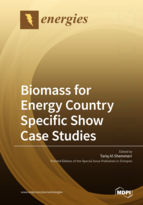Biomass for Energy Country Specific Show Case Studies
A special issue of Energies (ISSN 1996-1073).
Deadline for manuscript submissions: closed (31 May 2017) | Viewed by 31974
Special Issue Editor
Interests: renewable energy; combustion; biomass; heat exchangers and power generation
Special Issues, Collections and Topics in MDPI journals
Special Issue Information
Dear Colleagues,
There is ample evidence that the push for biomass as an alternative source of renewable energy to replace fossil fuels for heating and power generation is much greater than expected. There is a huge gap between the present contribution and the committed part of renewables for the majority of world countries.
The uptake of renewables in general, and biomass in particular, is still considered somewhat risky due to the lack of best practice examples to demonstrate how efficient the technology is today. Hence, the need to call for this Special Issue, focusing on country files, so that different nations’ experiences can be shared and best practices can be published, is warranted. This is realistic, as it seems that some nations have different attitudes to biomass, perhaps due to resource availability, or the technology needed to utilize biomass. Therefore, I suggest we go forward with this theme, and encourage scientists and engineers, who are researching in this field, to put forward case studies related to different countries. I certainly have one case study for the UK to put forward.
Prof. Dr. Tariq Al-Shemmeri
Guest Editor
Manuscript Submission Information
Manuscripts should be submitted online at www.mdpi.com by registering and logging in to this website. Once you are registered, click here to go to the submission form. Manuscripts can be submitted until the deadline. All submissions that pass pre-check are peer-reviewed. Accepted papers will be published continuously in the journal (as soon as accepted) and will be listed together on the special issue website. Research articles, review articles as well as short communications are invited. For planned papers, a title and short abstract (about 100 words) can be sent to the Editorial Office for announcement on this website.
Submitted manuscripts should not have been published previously, nor be under consideration for publication elsewhere (except conference proceedings papers). All manuscripts are thoroughly refereed through a single-blind peer-review process. A guide for authors and other relevant information for submission of manuscripts is available on the Instructions for Authors page. Energies is an international peer-reviewed open access semimonthly journal published by MDPI.
Please visit the Instructions for Authors page before submitting a manuscript. The Article Processing Charge (APC) for publication in this open access journal is 2600 CHF (Swiss Francs). Submitted papers should be well formatted and use good English. Authors may use MDPI's English editing service prior to publication or during author revisions.
Keywords
- biomass
- biomass heating
- biomass refrigeration
- biomass electricity
- renewable energy
- global Warming
- CO2 abatement






